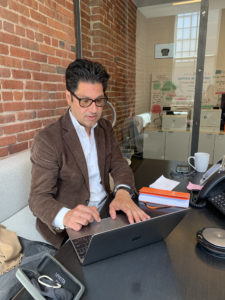Hemant Shah is experiencing those old feelings again: exhilaration combined with occasional doses of being overwhelmed.
Executive Summary
Hemant Shah, the co-founder of RMS, talks to Carrier Management Editor Mark Hollmer about the road to starting a new InsurTech, Archipelago, and the unique challenges and fortunate market timing that surrounds the launch of an early-stage company at the time of a pandemic.Shah, co-founder and former CEO of catastrophe modeling firm RMS, is in the throes of building a new company named Archipelago, a startup centered around building a risk data platform that uses artificial intelligence to digitize risk for large owners of commercial property.
The veteran entrepreneur and his co-founders began Archipelago’s building process in summer 2018, and the InsurTech startup recently came out of stealth mode after two years of intense development.
Being able to launch a startup from scratch once again has been a positive yet intense experience, Shah said.
“It’s exhilarating. It can be overwhelming at times, too,” Shah told Carrier Management in an email interview. “So much of what matters at this stage is about the people on your team. Creating trust, watching out for each other, building the courage and safety nets to take risks. Those things don’t just happen. They need to be earned.”
COVID-19 has added some complications to that relationship building, but Shah explained the company has overcome this creatively.
“So much of any early-stage company involves communication. We spend a lot of time, particularly with COVID and as a distributed organization across multiple time zones, learning how to listen and learn from one another,” Shah said. “It is often the simple things: following through when the coffee-bot on [business communication company] Slack pairs you with a colleague; taking time to just talk with your co-workers, knowing when it is time to switch off the damn Zoom camera and make an old-school call while taking a lap around the block.”
 “Starting Archipelago has re-energized and reminded me that I’m my better self when innovating, creating and solving new problems in fundamentally different ways.”
“Starting Archipelago has re-energized and reminded me that I’m my better self when innovating, creating and solving new problems in fundamentally different ways.”Shah said that launching during COVID-19 has produced some uncertainties, but the fact that employees are working digitally already has helped. What’s more, he said, Archipelago’s “digital proposition really resonates with the market.”
He said Archipelago’s platform has helped customers support their “virtual roadshows” and that it has simplified processes for underwriters looking to consolidate and access key information they need about their submissions.
Broadly speaking, the pandemic has forced companies to rethink how they conduct their work, and Shah said Archipelago is at an advantage in these times.
“That does increase opportunities for new innovations to take root,” Shah said. “As a CEO of a major insurance market shared with me the other day, ‘Your timing is spot on.'”
Old Friends, and the First Time Around
Archipelago is Shah’s second major professional job. His first involved the creation and shepherding of RMS, which he co-founded back in 1990 while he was still a Stanford University graduate student.
Canaan Partners General Partner Rich Boyle helped build RMS with Shah and is also an investor in Archipelago. The two met and became friends while they were undergraduates at Stanford University. Boyle recalled that they traveled together after college and he remained at RMS for nine years.
After Shah himself left RMS and decided to create what became Archipelago, Boyle had become a venture capitalist at Canaan. Boyle liked what he heard about Archipelago almost immediately.
“When Hemant told me about the concept over dinner one evening, I immediately expressed our interest in investing, and we ended up leading the seed funding round,” Boyle recalled.
He said Shah has come a long way from their days at Stanford, where both were “somewhat geeky” engineering students. At the same time, Shah still carries the positive qualities Boyle first noticed all those years ago.
“I think as much as anything I’d describe Hemant as ‘curious’—wanting to understand the how and why of things. And ‘driven’ definitely [also] applies. He’s also a very charismatic, intelligent leader with great vision for what the future state of a given effort could be and able to assemble a team to realize that vision.”
Shah was very much wrapped up in growing RMS before a March 2018 announcement that he had departed as CEO, to be replaced by veteran Silicon Valley technology executive Karen White. Back then, Shah made no public comment about his departure. RMS said little else beyond a statement from Paul Zwillenberg, CEO of RMS parent company DMGT, who thanked Shah “for his vision and dedication in growing RMS into a global leader” since he launched it nearly 30 years prior. RMS also celebrated its growth into an enterprise that produced more than $300 million in annual revenue. And that was that.
Asked about his departure from RMS two years later, Shah said simply that it was time to go.
“After over 25 years building RMS into its market-leading position, it was time for a new challenge,” he said. “Starting Archipelago has re-energized and reminded me that I’m my better self when innovating, creating and solving new problems in fundamentally different ways.”
Lessons Learned
Shah said that he learned a lot about earthquake and hurricane risks at RMS. But he became “absolutely fascinated” while there about “learning how insurance markets work, and why not when they don’t.”
“Efficient markets for risk and insurance provide abundant coverage at affordable prices while rewarding actions that reduce risk over time,” he said. “Unfortunately, it doesn’t always work that way in the real world. We all need to do what we can to drive positive change, and the stakes have never been greater to do so.”
Shah said RMS and Archipelago are linked by a broad idea: “What Archipelago has in common with RMS is they’re both purpose-driven by my conviction that technology can catalyze more efficient and effective insurance markets, which in turn create more resilient societies,” Shah said. “Clearly, we still have a lot of work to do.”
The New Venture
Archipelago is designed around the idea of “using AI to digitize risk so large owners of commercial property—a $25 trillion asset class—can increase their resiliency and lower their total cost of risk, including by improving their insurance outcomes,” Shah noted. “To drive positive change, we are going upstream—approaching the problem not from the insurers’ perspective but from the customers’ perspective. After all, it’s their risk and data, and insurance is just one facet of their world. But by solving for ‘upstream,’ brokers and insurers will benefit as well.”
Archipelago launched after close to two years of R&D and validation, “in collaboration with our foundational customers,” Shah said. Those foundational customers “are institutional property owners who develop, own and operate over $500 billion in assets [in total],” he added, pointing out that they are also “all large buyers of commercial property insurance.”
At the moment, Archipelago is a Series A-stage venture-backed company, with 50 people now on its team. They’re focused mostly in technology, data science and engineering, Shah said.
The company has several founding investors. Beyond Canaan Partners, they include Ignition Ventures and Zigg Capital. Shah said that Ignition and Canaan are Silicon Valley investors focused on technology and data-science ventures, and Zigg, which is based in New York City, “specializes in ‘prop-tech” [property technology] opportunities.”
Boyle said that Shah’s experience gained from building RMS shows in his new venture “without question.”
“Hemant was in his early 20s when founding RMS and hadn’t built a company before. It’s very different when you are an experienced CEO who’s managed a large organization before,” he said. “That general notion—leveraging his experience of having walked this walk before—absolutely makes much of the process very different.”
At the same time, Shah continues with an “open-minded discovery process of talking to customers, understanding their points of view and their unique problems, and then mapping that to the solution that the company is building,” Boyle said.
He added that “Archipelago is building something very different than RMS, and so some knowledge of how to build a company is very helpful, but it’s still necessary to really understand those customers’ problems and to propose a solution.”
The Competition
Who are—and who will be—Archipelago’s competition?
When asked that question, Shah replies “the status quo.”
“Across the market we hear risk managers, brokers and insurers struggle over the same pain chain. Given historic practices, we empathize with those who don’t feel in control of the situation or who view the solution as someone else’s problem. And it’s easy to get distracted by localized fixes that don’t get to the heart of the matter,” Shah said. “Our approach is to go upstream and build a shared system of trust to connect the data, creating win-wins for everyone involved.”
Shah’s goal for Archipelago is to build something, in part, that “that delivers sustainable value” to its customers. But he also wants to build excellence within, “where our team is able to do the best work of their careers, where we’ve earned the trust and enthusiasm of our customers, and the market embraces us as a force for positive change across the entire value chain.”
Goals aside, Shah remains both excited and worried as he builds something new.
“We’re hitting all of our milestones, so I’m optimistic,” Shah said. “And I worry about everything. Everyday.”





















 Winter Storm Fern to Cost $4B to $6.7B in Insured Losses: KCC, Verisk
Winter Storm Fern to Cost $4B to $6.7B in Insured Losses: KCC, Verisk  Modern Underwriting Technology: Decisive Steps to Successful Implementation
Modern Underwriting Technology: Decisive Steps to Successful Implementation  20,000 AI Users at Travelers Prep for Innovation 2.0; Claims Call Centers Cut
20,000 AI Users at Travelers Prep for Innovation 2.0; Claims Call Centers Cut  Preparing for an AI Native Future
Preparing for an AI Native Future 










